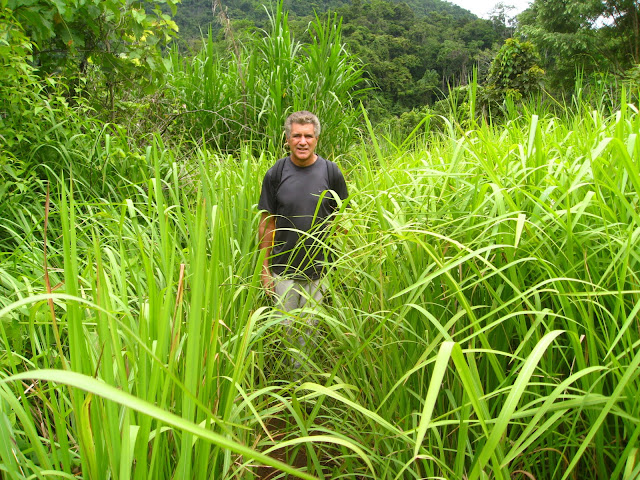“Today in business, the greatest opportunities are emerging markets. Most business graduates today will be involved in international business, either in seeking out opportunities or defending more robust competitors from these newly transformed economies. That’s where the business is!” – Professor Dickstein
The Program
Emerging Markets Field Study (EMFS) courses provide students with a global perspective and an opportunity to gain hands-on international experience with multinational and local companies.Students learn about businesses in emerging markets, experience their operations and challenges first-hand. Class attendance is required, as is the field trip, which involves visiting a variety of companies as well as some cultural activities.
Location may vary from year to year.
Faculty for 2011 trip
Professor Steven Dickstein
A picture of Professor Dickstein taken on a jungle walk outside Luang Prabang in Laos in 2009
A brief description of yourself and why you chose to teach this class
I’m from NYC and came out to Columbus in 1976 for a job with a (then) Fortune 100 company, Borden. My 18 years there included nearly half with international involvement. When my tennis and prospective business partner dropped dead suddenly of a heart attack, I decided it was time for a different direction. I had a serendipitous opportunity at Fisher and went on to gradually add the international classes that represented my greatest career interest. I also felt that many of these topics in international business are best taught from experience rather than by concepts in a text. So, I currently have two CIBER courses, each with a short term travel component, and the International Operations elective.
International travel experience
My international travel experience is nearing about 50 countries, I estimate, and represents cumulatively about three years of my life. The irony is that I was an undergraduate Aerospace Engineer and had never been on an airplane until late in my third year of school. My first international experience was after college on a one week trip to France and England. I have traveled at the high end and low end, but it’s all good and a learning experience. Once, on a North Sea ferry to Newcastle, we overnighted on deck with an English couple who expressed a great interest in visiting the U.S. This puzzled me since, unlike Europe, our history, our architecture, etc. is all new and seems rather uninteresting by comparison. But, he reminded me, no other country has a greater influence on their (and other) lives. This was one experience that expanded my global awareness, which thirty + years later was reinforced during a visit to Mexico in which at a business presentation to Fisher students, the executive said his business has no borders (in effect, there is NO international business) since “borders are for politicians”.
Most of our travels focus on Europe and Asia, and not in any usual approach. For example, starting from Hong Kong, my wife and I took a passenger-cargo ship to Singapore, then traveled by bus and train all the way north to Chang Mai in Thailand. We were early visitors to China just after the Nixon opening and now have a son two years out of business school with a job in Dublin, Ireland. Overall, I have circumnavigated the globe five times: two by air, two by ship, and one a combination.
 There was a famous bank robber in the U.S. during the 1950s, I believe, named Willie Sutton. He was a gentleman rather than a shoot-em-up gangster. When he was finally caught, he was asked by reporters why a smart man like him would rob banks. He responded, “Because that’s where the money is.”
There was a famous bank robber in the U.S. during the 1950s, I believe, named Willie Sutton. He was a gentleman rather than a shoot-em-up gangster. When he was finally caught, he was asked by reporters why a smart man like him would rob banks. He responded, “Because that’s where the money is.” Pic on the right depicts a mugshot image of Willie Sutton.
Today in business, the greatest opportunities are emerging markets. Most business graduates today will be involved in international business, either in seeking out opportunities or defending more robust competitors from these newly transformed economies. That’s where the business is!
Today in business, the greatest opportunities are emerging markets. Most business graduates today will be involved in international business, either in seeking out opportunities or defending more robust competitors from these newly transformed economies. That’s where the business is!
As for the specific relevance to Panama, 95% of global trade moves by ship, and a fair proportion of this volume transits the Canal. The trip is an opportunity to visit with global companies and local ones and actually meet with supply chain providers. And, for those anxious not merely to expand their global business acumen but also their cultural awareness, in the first class you will hear about an unlikely connection between Panama and the artist Paul Gaugin and (separately) the rock guitarist Jimmi Hendrix as well as the role Panama played in providing cadavers to American medical schools.
Disclaimer
All views and opinions listed on this blog is solely mine, and is not affiliated with the Fisher College of Business or the Ohio State University in any ways. If you have a question or comment, write to me at junhsien@live.com
